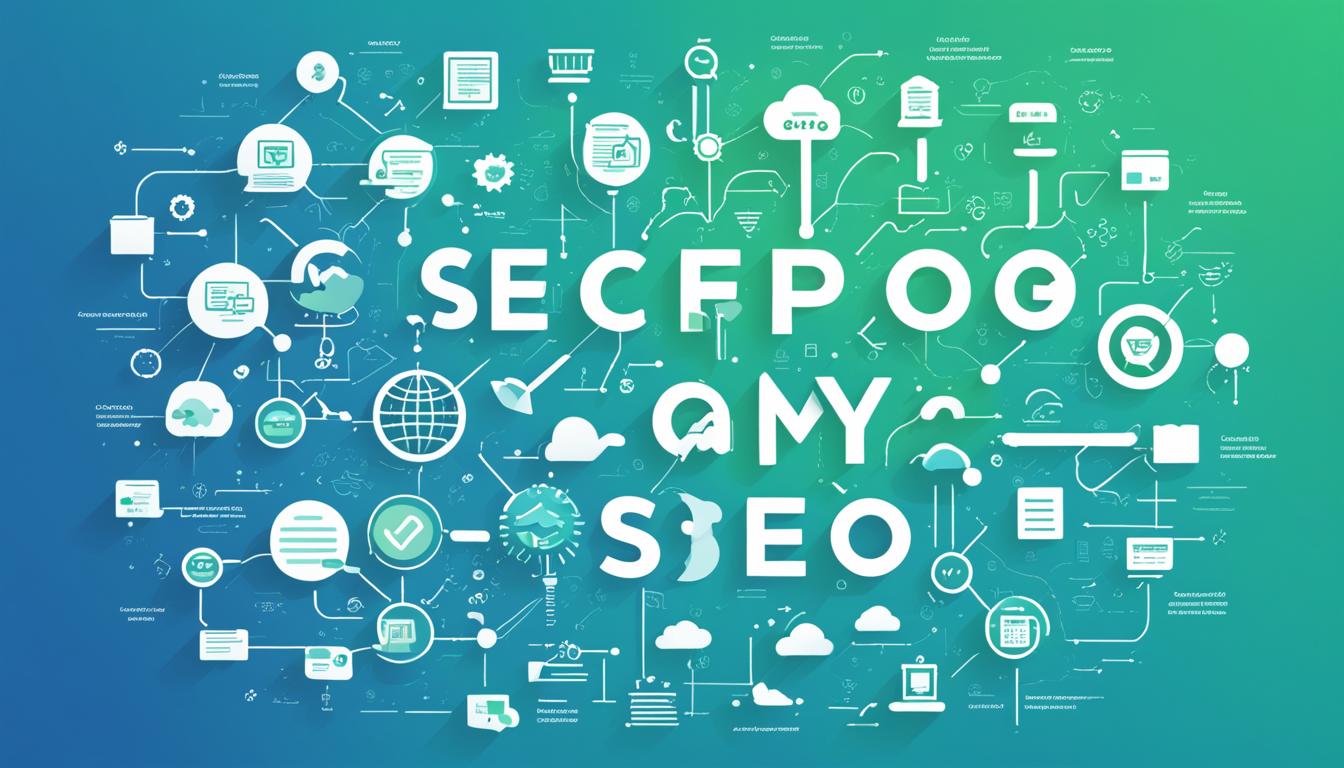
Gaining visibility and attracting organic traffic is essential for any marketer in today's digital landscape. To achieve these goals, understanding the ins and outs of search engine optimization (SEO) is crucial. In this section, I will provide a comprehensive SEO glossary of terms that every marketer should know. By familiarizing yourself with these terms, you'll be equipped with the knowledge needed to optimize your website and drive more organic traffic.
Key Takeaways:
- By understanding key SEO terms, marketers can navigate the world of SEO more effectively.
- On-Page Optimization techniques such as meta tags, keyword density, and header tags can improve website visibility.
- Off-Page Optimization activities like building backlinks and leveraging social signals enhance a website's authority.
- SEO Tools and Analytics provide valuable insights for refining and improving SEO strategies.
- Understanding SEO terms empowers marketers to optimize their websites, improve rankings, and drive organic traffic.
On-Page Optimization
On-Page Optimization is a crucial aspect of SEO that focuses on optimizing individual web pages to achieve higher search engine rankings and drive relevant traffic. By implementing various techniques such as optimizing meta tags, maintaining proper keyword density, and incorporating header tags, marketers can improve their website's visibility and attract more organic traffic.
Meta tags play a vital role in providing search engines with information about the content of a web page. By optimizing meta tags, marketers can effectively communicate the relevance and value of their web pages to search engines and users. This includes crafting compelling meta titles that capture the essence of the content and meta descriptions that entice users to click through to the website.
Keyword density refers to the frequency with which keywords are used in a web page's content. By maintaining an appropriate keyword density, marketers can signal to search engines that their web page is highly relevant to specific search queries. It is important to strike a balance between using keywords naturally and over-optimization, as search engines can penalize websites for keyword stuffing.
Header tags, such as h1, h2, h3, etc., are HTML tags used to structure the content and indicate its hierarchy. Search engines consider header tags when determining the topic and relevance of a web page. By strategically incorporating relevant keywords within header tags, marketers can optimize their content for better search engine visibility.
Benefits of On-Page Optimization
Implementing on-page optimization techniques offers several benefits:
- Improved search engine rankings: By optimizing meta tags, keyword density, and header tags, websites can rank higher in search engine results, leading to increased visibility and organic traffic.
- Enhanced user experience: On-page optimization helps to improve the overall user experience by organizing content with header tags, making it easier to navigate and understand.
- Increased click-through rate: Compelling meta titles and descriptions attract users' attention and encourage them to click on the search result, driving more traffic to the website.
- Better keyword targeting: Optimizing keyword density allows websites to target specific keywords effectively and increase their chances of ranking for relevant search queries.

Effective on-page optimization is an essential component of any successful SEO strategy. By optimizing meta tags, maintaining proper keyword density, and incorporating header tags, marketers can improve their website's visibility in search engine results and attract more organic traffic.
Off-Page Optimization
Off-Page Optimization is a crucial component of SEO that focuses on improving website authority and reputation through external factors. By implementing effective Off-Page Optimization strategies, marketers can enhance their website's visibility, credibility, and relevancy, ultimately driving more organic traffic and boosting search engine rankings.
One key aspect of Off-Page Optimization is building high-quality backlinks. Backlinks are links from other websites that direct users to your website. Search engines consider backlinks as a vote of confidence, indicating that your content is valuable and trustworthy. Building a strong network of relevant and authoritative backlinks can significantly boost your website's authority and improve its chances of ranking higher in search results.
Link building activities are another essential part of Off-Page Optimization. This involves actively seeking opportunities to acquire new backlinks from reputable sources. Effective link building strategies include guest posting, content syndication, and outreach campaigns. These activities help increase your website's visibility across various platforms, attract new audiences, and improve your overall online presence.
To succeed in Off-Page Optimization, it is crucial to focus on quality rather than quantity. Building a few high-quality backlinks from authoritative websites is more valuable than having numerous low-quality backlinks from irrelevant sources.
Another factor that plays a vital role in Off-Page Optimization is leveraging social signals. Social signals refer to the level of engagement and interaction your website receives on social media platforms. When users share, like, or comment on your content, it sends positive signals to search engines, indicating that your website is popular, relevant, and valuable. Incorporating social media marketing into your overall SEO strategy can help increase brand visibility, attract more traffic, and strengthen your website's Off-Page Optimization efforts.
Implementing successful Off-Page Optimization techniques requires a strategic and well-rounded approach. By focusing on building high-quality backlinks, engaging in effective link building activities, and leveraging social signals, marketers can enhance their website's authority, credibility, and visibility in the crowded online landscape.

Benefits of Off-Page Optimization:
- Improved search engine rankings
- Increase in organic traffic
- Enhanced website authority and credibility
- Expanded online visibility and brand awareness
- Attracting relevant and engaged audiences
Factors to Consider in Off-Page Optimization:
- Quality of backlinks
- Relevance of backlinks to your industry or niche
- Trustworthiness and authority of linking websites
- Diversity of backlink sources
- Engagement and interaction on social media platforms
| Off-Page Optimization Techniques | Benefits |
|---|---|
| Building high-quality backlinks from authoritative websites | Improves website authority and search engine rankings |
| Engaging in link building activities such as guest posting and content syndication | Increases online visibility and attracts new audiences |
| Leveraging social signals through social media marketing | Enhances brand visibility and drives organic traffic |
SEO Tools and Analytics
As an SEO professional, I understand the importance of utilizing the right tools and analytics to monitor and optimize SEO efforts. These tools provide valuable insights into various aspects of SEO, allowing marketers to make data-driven decisions and drive better results. Let's explore some of the key SEO tools and analytics that every marketer should be familiar with:
1. Keyword Research Tools
Keyword research is the foundation of any successful SEO strategy. By understanding what keywords your target audience is searching for, you can optimize your website's content to attract more organic traffic. Here are some popular keyword research tools:
| Tool | Description |
|---|---|
| Google Keyword Planner | A free tool by Google that provides keyword ideas, search volume, and competition data. |
| Ahrefs | A comprehensive SEO tool that offers in-depth keyword research, competitor analysis, and search volume data. |
| Semrush | An all-in-one SEO tool that provides keyword research, competitor analysis, and content optimization features. |
2. Competitor Analysis Tools
Staying ahead of the competition is crucial in the world of SEO. Competitor analysis tools help you understand what strategies your competitors are using and identify opportunities for improvement. Here are some popular competitor analysis tools:
- SpyFu
- SEMRush
- Ahrefs
3. Rank Tracking Tools
Tracking your website's search engine rankings is essential for monitoring the effectiveness of your SEO efforts. Rank tracking tools allow you to monitor keyword rankings, track progress, and identify areas for improvement. Here are some popular rank tracking tools:
- Google Search Console
- SEMrush
- Ahrefs
These tools provide invaluable insights into your website's performance, allowing you to make data-driven decisions and optimize your SEO strategy for better results. Remember, knowledge is power in the world of SEO, and leveraging the right tools and analytics can give you a competitive edge.
By utilizing SEO tools and analytics, marketers can refine and improve their SEO strategies, ultimately leading to better search engine rankings and increased organic traffic.
Conclusion
In conclusion, understanding the various terms and techniques involved in SEO is crucial for every marketer. By familiarizing themselves with this SEO glossary, marketers can effectively optimize their websites, improve search engine rankings, and drive more organic traffic. With the right knowledge and tools, marketers can unlock the mysteries of SEO and achieve online success.
Implementing on-page optimization strategies such as optimizing meta tags, maintaining appropriate keyword density, and using header tags can significantly improve a website's visibility in search engine results. Off-page optimization, on the other hand, focuses on building a website's authority through high-quality backlinks, engaging in link building activities, and leveraging social signals.
Monitoring and analyzing SEO efforts using tools and analytics is essential for refining and improving strategies. SEO tools and analytics provide valuable insights into keyword research, competitor analysis, and ranking tracking, helping marketers stay ahead of the competition and make data-driven decisions.
By combining a comprehensive understanding of SEO terms, implementing optimization strategies, and utilizing the right tools, marketers can drive more organic traffic, improve search engine rankings, and ultimately achieve online success. It is an ongoing process that requires continuous learning, adaptation, and staying up-to-date with the latest industry trends. With dedication and a strategic approach, marketers can harness the power of SEO to increase their online visibility and reach their target audience effectively.
FAQ
What is On-Page Optimization?
On-Page Optimization refers to the practice of optimizing individual web pages to rank higher and earn more relevant traffic in search engine results. It involves techniques such as optimizing meta tags, using proper keyword density, and incorporating header tags.
What is Off-Page Optimization?
Off-Page Optimization focuses on improving a website's authority and reputation through external factors. This includes building high-quality backlinks, engaging in link building activities, and leveraging social signals.
Why are SEO Tools and Analytics important?
SEO Tools and Analytics are essential for monitoring and optimizing SEO efforts. They provide valuable insights into keyword research, competitor analysis, and ranking tracking. By utilizing these tools, marketers can refine and improve their SEO strategies.











